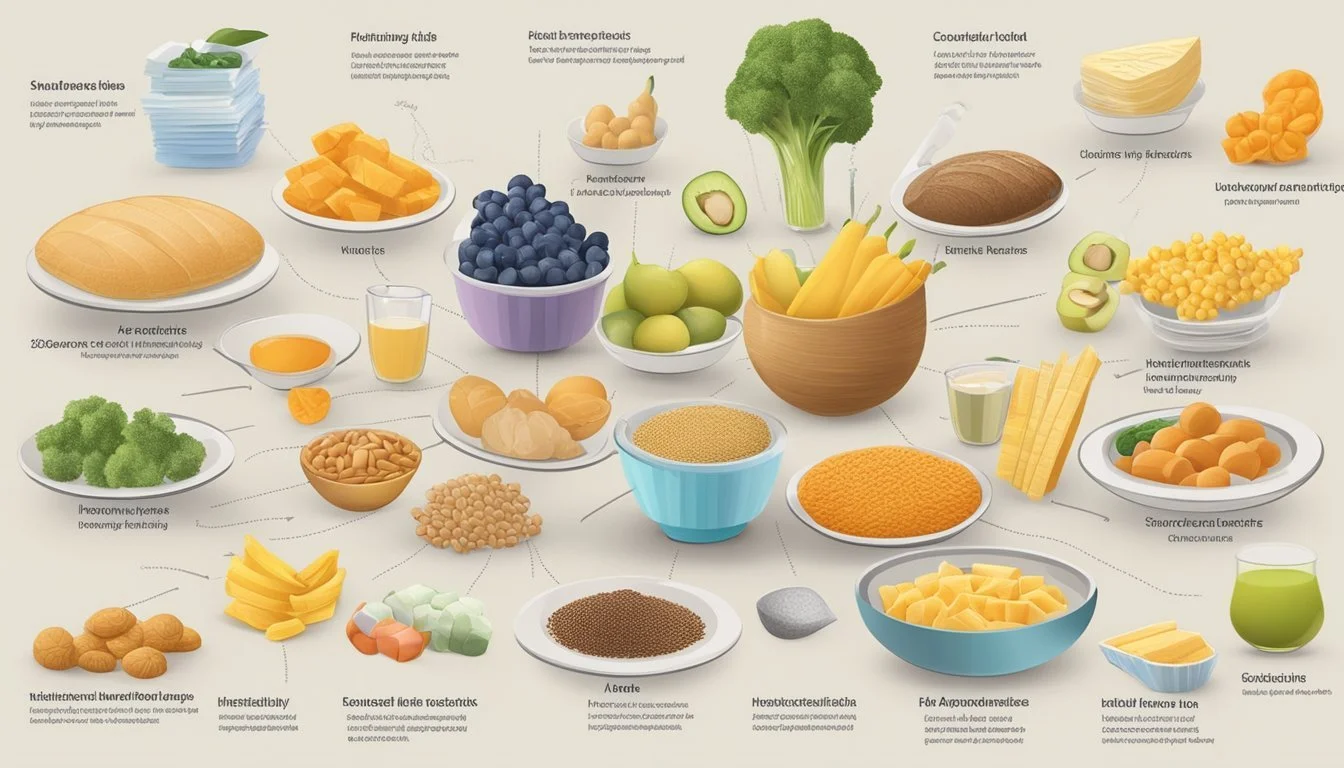10 Unhealthy Foods That Are Actually Good for You
Surprising Health Benefits
Popular belief often labels certain foods as unhealthy, suggesting they should be avoided to maintain a balanced diet. This perception can sometimes be misleading, as it overlooks the nuanced nutritional profiles of these foods.
The reality is that some foods commonly regarded as harmful can actually offer substantial health benefits. Recent research has challenged the stigma attached to these items, revealing their potential to support well-being when consumed in moderation.
1) Dark Chocolate
Dark chocolate, often perceived as a guilty pleasure, actually offers notable health benefits when consumed in moderation.
It is rich in antioxidants, particularly flavonoids, that contribute to heart health by improving blood flow and reducing blood pressure.
Dark chocolate contains significant amounts of minerals like iron, magnesium, and zinc, which are essential for various bodily functions.
Consuming dark chocolate with at least 70% cocoa content can aid in mood enhancement due to its positive effects on the gut microbiome.
A small portion, such as 1-2 ounces per day, can provide these benefits without excessive calorie intake.
2) Full-Fat Yogurt
Full-fat yogurt, often overlooked for its reduced-fat counterparts, offers several health benefits.
Studies have shown that full-fat yogurt can support cardiovascular health. Contrary to previous beliefs, consuming full-fat dairy products does not necessarily lead to heart disease.
Full-fat yogurt is rich in probiotics. These beneficial bacteria aid in maintaining a healthy gut, improving digestion, and boosting the immune system.
It is also a good source of essential nutrients. It provides calcium, protein, and vitamins such as B12, promoting bone health and muscle function.
Full-fat yogurt helps with satiety. The presence of healthy fats can keep one feeling fuller for longer, which could be beneficial for weight management.
Using full-fat yogurt in moderation can be part of a balanced diet. Many appreciate its creamy texture and rich flavor in various dishes.
3) Avocado
Avocados have gained popularity for their impressive nutritional profile. They are rich in monounsaturated fats, which are known to lower LDL (bad) cholesterol levels. These healthy fats are also beneficial for heart health.
Besides fats, avocados are a great source of fiber. Half an avocado contains almost 5 grams of fiber, contributing significantly to daily fiber needs. This makes them a filling food option.
In terms of vitamins and minerals, avocados are packed. They offer essential nutrients like folate, copper, potassium, vitamin K, and vitamin B5. These nutrients support overall bodily functions, including maintaining healthy skin and sharp vision.
Daily avocado consumption may help in weight management. Studies suggest that the fiber and fat content in avocados can prevent weight gain and even reduce visceral fat, particularly among females. Additionally, avocados are known to reduce markers of inflammation.
Incorporating avocados into your diet can provide multiple health benefits without compromising on taste. Whether added to salads, spread on toast, or eaten on their own, avocados are a versatile and nutritious choice.
4) Coconut Oil
Coconut oil has gained popularity for its potential health benefits, despite its high saturated fat content. Used in cooking and skincare, this plant-based oil is known for its versatile applications.
Recent research shows coconut oil may help increase HDL (good) cholesterol. However, it's important to note that it also raises LDL (bad) cholesterol more than other plant-based oils like olive or canola.
Coconut oil contains medium-chain triglycerides (MCTs), which could aid in fat burning. The MCTs are easy to digest, providing a quick source of energy. Though the amount of MCTs in coconut oil is relatively small, their potential benefits should not be overlooked.
Virgin coconut oil is derived from fresh meat, while refined oil comes from dried coconut, known as copra. Both types are commonly used in cooking and beauty products. Each type of oil has distinct characteristics and uses.
One tablespoon of coconut oil contains about 12 grams of saturated fat. This places it on par with other high-fat foods like butter. While high in saturated fat, it's now believed that not all saturated fats are harmful.
Coconut oil can be part of a balanced diet when used in moderation. It's essential to balance its consumption with other heart-healthy fats to maintain overall well-being.
5) Popcorn
Popcorn, often thought of as a guilty pleasure, can actually be a beneficial addition to a balanced diet.
Air-popped popcorn is low in calories, with about 93 calories in a three-cup serving. It also has 3 grams of protein, 18.6 grams of carbohydrates, and 3.6 grams of fiber.
As a whole grain, popcorn provides fiber, which aids in digestion and helps maintain a healthy gut. It can also help with satiety, making one feel fuller for longer, reducing the likelihood of overeating.
When prepared with minimal butter and salt, popcorn can be a satisfying and wholesome snack. Using healthier toppings like nutritional yeast or a small amount of olive oil can enhance its flavor without adding excessive calories or unhealthy fats.
6) Coffee
Contrary to common belief, coffee holds several surprising health benefits when consumed in moderation. Studies indicate that drinking 2-5 cups daily is linked to a lower likelihood of type 2 diabetes and heart disease.
Coffee is rich in antioxidants, which can enhance brain function and may lower the risk of Alzheimer's and Parkinson's diseases. Additionally, these antioxidants play a role in reducing inflammation within the body.
The caffeine in coffee can improve mental alertness and physical performance. Research suggests that regular coffee drinkers have a lower risk of depression, potentially lowering the risk of early death.
Some potential concerns include caffeine-induced insomnia and anxiety in sensitive individuals. Pregnant and breastfeeding women should be cautious about their intake.
Overall, with mindful consumption, coffee can be a delightful and healthful addition to one’s diet.
7) Red Wine
Red wine often finds itself on the list of indulgences, yet it possesses some surprising health benefits when consumed in moderation.
The key beneficial compound found in red wine is resveratrol, which comes from the skin of grapes used to produce the wine. Studies have indicated that resveratrol can improve heart health by protecting the lining of blood vessels in the heart and boosting HDL cholesterol levels.
In addition to resveratrol, red wine contains polyphenols, antioxidants that have been linked to reduced heart disease risk. These antioxidants help to combat inflammation and oxidative stress, both of which can contribute to heart issues.
Moderate consumption of red wine is recommended—about 5 ounces per day. This moderate intake is crucial, as excessive consumption can lead to health issues rather than benefits.
It’s worth noting that some non-alcoholic sources, such as grape juice, peanuts, blueberries, and cranberries, also contain resveratrol. These can be suitable alternatives for those who prefer not to drink alcohol.
Although red wine is not a cure-all, incorporating it sensibly into one's diet may offer some heart health perks. Regular consumption should be balanced with a healthy lifestyle to maximize potential benefits.
8) Eggs
Eggs have long been a topic of debate in nutrition circles. Despite their reputation for being high in cholesterol, they offer numerous health benefits.
A single egg contains approximately 78 calories and 6 grams of protein. This makes them an efficient source of nutrition for those looking to build or maintain muscle.
In addition to protein, eggs are rich in essential nutrients like vitamin D, which supports bone health and the immune system. They also contain choline, which is crucial for brain development and liver function.
Eating eggs can help absorb more vitamins from other foods. For instance, adding an egg to a salad can increase the amount of vitamin E your body absorbs.
Eggs also support memory and mood due to their choline content. This nutrient plays an important role in muscle control and the overall nervous system function.
Including eggs in a balanced diet can be beneficial. Many enjoy them as a part of breakfast or use them in various recipes.
Despite some concerns, moderate egg consumption can fit into a healthy diet plan. Just be cautious of high-calorie add-ons like cheese or bacon.
Eggs offer a lot more than their old reputation might suggest. Incorporating them into meals can provide essential nutrients without adding excessive calories or unhealthy fats.
9) Peanut Butter
Peanut butter is often criticized for being high in calories and fat. Yet, it contains beneficial nutrients when consumed in moderation.
Rich in protein, peanut butter provides a substantial energy boost. This makes it a popular choice among those looking to maintain muscle mass.
Including peanut butter in a balanced diet may also help improve heart health. It contains healthy fats, such as monounsaturated and polyunsaturated fats, which can lower bad cholesterol levels.
This spread also offers a good dose of vitamins and minerals. It is particularly high in Vitamin E, magnesium, and potassium, which support various bodily functions, including the immune system and nerve function.
Opting for natural peanut butter with no added sugars or hydrogenated oils can maximize these health benefits while avoiding unnecessary additives.
10) Cheese
Cheese often gets a bad rap due to its fat and calorie content. Despite this, it can actually be quite beneficial when consumed in moderation.
Certain cheeses are rich in nutrients. For instance, Cheddar provides high amounts of protein, calcium, and vitamin A. These nutrients are essential for maintaining bone health and supporting muscle function.
Cheese also contains selenium, an antioxidant that helps the immune system. Varieties like cottage cheese offer additional options that can be lower in fat and sodium.
Many people rely on cheese as a primary source of calcium in their diet. This is crucial for strong bones and teeth, especially in those who might not consume other calcium-rich foods.
While some cheeses, like Roquefort, are high in sodium, it's important to balance consumption with lower-sodium options. Opting for cheeses like mozzarella can help manage intake without sacrificing taste.
Cheese's diverse nutrient profile makes it a valuable addition to meals. Moderation and variety can ensure you're getting the benefits without the drawbacks.
Nutritional Misconceptions
People often believe certain foods are unhealthy without understanding the full context. This section clarifies widespread myths and highlights the importance of moderation.
Common Myths About 'Unhealthy' Foods
One common myth is that all fats are bad. In the 1990s, low-fat diets became popular, leading people to avoid fats altogether. However, there are healthy fats, like omega-3 and omega-6 fatty acids found in fish, nuts, and seeds, which are essential for brain and heart health.
Another myth surrounds carbohydrates, often viewed as diet wreckers. While processed carbs like white bread and sweets can be unhealthy, whole grains, fruits, and vegetables offer necessary nutrients and energy. These complex carbs also aid digestion and help maintain steady blood sugar levels.
Sugary foods are also frequently demonized. Though excessive sugar can lead to health issues, natural sugars in fruits provide vitamins, fiber, and antioxidants that boost overall health. Dark chocolate, often criticized for its sugar content, contains beneficial antioxidants when consumed in moderation.
Role of Moderation
Moderation plays a crucial role in dispelling these misconceptions. Eating a balanced diet allows one to enjoy a variety of foods without overindulging. For instance, consuming red meat in moderation provides essential nutrients like iron and protein without the associated risks of high intake.
Portion control can transform traditionally "unhealthy" foods into healthy choices. Small amounts of cheese, for example, can add calcium and protein to the diet without contributing excessive fat. Similarly, moderate consumption of coffee offers antioxidants and can improve mental alertness.
Finally, understanding portions and variety is key. Limiting intake of highly processed foods while incorporating whole foods ensures a balanced and healthy diet. By practicing moderation, individuals can enjoy all types of food without compromising their health.
Scientific Evidence Supporting 'Unhealthy' Foods
Recent research has brought to light intriguing findings about foods often considered unhealthy, revealing their hidden nutritional benefits. Key insights provided below highlight these discoveries and the nutritional profiles of these foods.
Recent Studies and Findings
In the past few years, numerous studies have re-examined the health effects of foods typically deemed unhealthy. For instance, a recent investigation into white bread showcased its modest fiber content, challenging earlier assumptions of its negligible health value.
Similarly, certain dairy products, traditionally criticized for their fat content, have been shown to provide essential nutrients like calcium and vitamin D.
Scientific American reported on a 2019 French study which found that despite the higher mortality risk associated with ultra-processed foods, specific items like ham and chicken nuggets were not uniformly detrimental when consumed in moderation.
Such nuanced understanding helps in re-assessing dietary choices, emphasizing moderation and balanced consumption rather than outright avoidance.
Nutrient Profiles of Misunderstood Foods
Several foods often labeled as unhealthy contain surprising nutritional benefits. White bread, for example, contains about 0.03 oz (1g) of fiber per slice, which though less than wholemeal bread, still contributes to daily fiber intake.
Chocolate, another commonly misunderstood food, is rich in antioxidants and has been linked to improved heart health when consumed in dark varieties.
Full-fat dairy products provide essential nutrients such as vitamin D, calcium, and protein. These findings suggest that the health impacts of these foods are more complex than previously thought, with benefits that should not be overlooked.
By carefully considering these nutrient profiles, individuals can make more informed dietary choices that incorporate a broader range of food options.
Balancing Diet With 'Unhealthy' Foods
Incorporating so-called 'unhealthy' foods can still be part of a healthy diet if balanced properly. Focus on the nutritional value and how these foods fit into daily meals.
Importance of a Balanced Diet
A balanced diet ensures that the body receives essential nutrients. It includes a variety of foods from different food groups: fruits, vegetables, proteins, dairy, and grains. Even foods often labeled as 'unhealthy' can provide nutrients such as vitamins, minerals, and healthy fats if consumed in moderation. For instance, dark chocolate contains antioxidants, and full-fat dairy products have calcium and vitamin D.
Balance is key. Combining these foods with nutrient-dense options maintains overall health. Eating such foods sporadically prevents excess calorie intake and maintains a well-rounded diet. Variety and moderation are essential to achieve nutritional goals.
Meal Planning Tips
Effective meal planning helps incorporate 'unhealthy' foods without overindulgence. Start by listing meals for each day, including healthy staples bolstered by occasional indulgences. For example, pair a small portion of crisps with a leafy green salad to add a crunchy texture while ensuring a high intake of vitamins and fiber.
Use smaller portions to keep calorie count low. Layer these foods with nutrient-dense choices such as lean proteins, whole grains, and plenty of vegetables. This approach maintains satisfaction and nutritional balance. Consider a daily or weekly treat to keep cravings satisfied without deviating from dietary goals.
By planning ahead and making thoughtful choices, 'unhealthy' foods can fit comfortably into a balanced diet, promoting both satisfaction and health.








